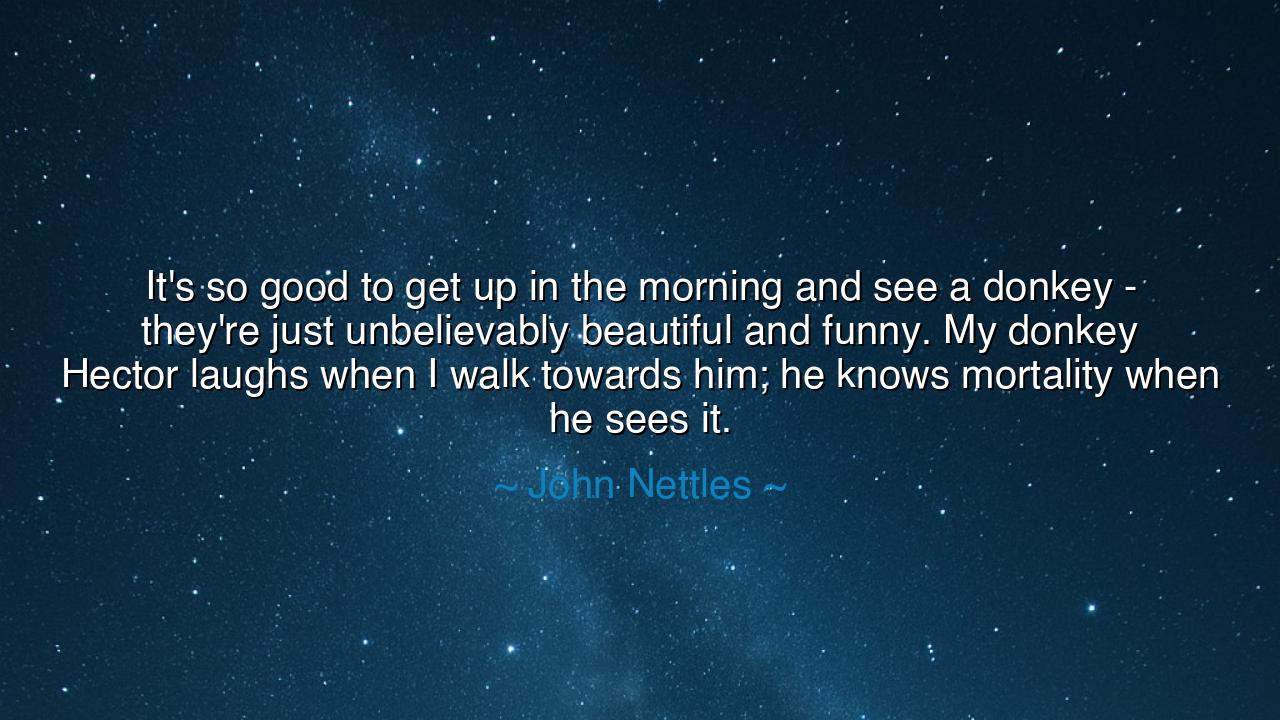
It's so good to get up in the morning and see a donkey - they're
It's so good to get up in the morning and see a donkey - they're just unbelievably beautiful and funny. My donkey Hector laughs when I walk towards him; he knows mortality when he sees it.






In the words of John Nettles, “It’s so good to get up in the morning and see a donkey – they’re just unbelievably beautiful and funny. My donkey Hector laughs when I walk towards him; he knows mortality when he sees it.” — there resounds a quiet, sacred truth about the nature of humility, mortality, and the simple joy of life. Though spoken with humor, Nettles’ reflection carries the depth of ancient wisdom. It is not merely about the affection of a man for his animal, but about the recognition of our place in the great order of creation. For in the gaze of a creature so plain, so unassuming as the donkey, the human soul is reminded of its own limits — of its frailty, its foolishness, and its fleeting existence upon the earth.
The meaning of this quote lies in the union of laughter and wisdom. The donkey, so often mocked for its stubbornness and simplicity, becomes here a teacher — a mirror through which man sees himself clearly. Nettles speaks of Hector, his donkey, who “laughs” at him — not in mockery, but in knowing amusement. There is tenderness in that laughter, the laughter of nature at man’s solemnity. For man, in his endless striving and self-importance, forgets that he is mortal, that his grandeur fades, that his monuments crumble. The donkey, ancient companion of farmers, prophets, and wanderers, stands as a living reminder of simplicity — a creature at peace with the rhythm of life, unmoved by vanity or ambition.
In the stories of the ancients, the donkey was not a fool, but a vessel of truth. It was a donkey that carried Christ into Jerusalem, symbolizing humility before triumph. It was the donkey of Balaam, in the old Hebrew scriptures, that saw the angel of the Lord when the man could not — for the creature’s eyes were open where human pride was blind. Nettles’ words echo this lineage of wisdom: he sees in Hector not a beast of burden, but a philosopher in fur and hooves — one who laughs at mortality because he lives untouched by the illusions of human ego.
The origin of such an insight comes from the meeting of two worlds — the mortal and the eternal, the serious and the comic. Nettles, a man of art and intellect, finds in the presence of his donkey a truth that scholars and kings have often missed. When he says that Hector “knows mortality when he sees it,” he confesses something profound: that animals, in their innocence, understand life better than we who seek to master it. The donkey does not brood over death or glory; he simply is — alive in the present moment, joyful in the morning light. His laughter, whether imagined or real, is the laughter of creation itself, gently mocking man’s tragic obsession with permanence.
Consider the story of Diogenes, the philosopher who renounced wealth and lived in a barrel. When Alexander the Great offered him anything he desired, Diogenes replied, “Stand out of my sunlight.” Like Hector the donkey, Diogenes laughed at human grandeur — not out of scorn, but out of freedom. He knew that to live well, one must shed the illusions of control. The donkey’s laughter is of the same kind — not cruel, but wise; not arrogant, but grounded. To see such beauty and humor in a humble creature is to rediscover reverence — for all living things, and for the fragile, fleeting spark of our own existence.
The lesson, then, is this: seek joy not in the grand or the complex, but in the simple and the true. Rise in the morning, as Nettles does, and look upon life — even the smallest part of it — with gratitude and wonder. Let the animals, the trees, the quiet corners of the earth remind you of what you are: a passing soul, blessed to breathe for a little while beneath the same sky. Do not take yourself too seriously, for mortality is not an enemy to fear, but a truth to embrace. And if you can laugh — as Hector does — at your own smallness, then you have already learned the secret of peace.
Therefore, my friends, learn from John Nettles and his wise donkey. Find beauty in what the world calls ordinary. See the sacred in the simple. When the day feels heavy, step outside and look upon something alive — a bird, a flower, even a donkey — and remember that it, too, shares this journey of existence. Let laughter be your prayer and humility your strength. For when the creatures of the earth can smile upon us, they remind us of the greatest truth of all: that to live well is not to conquer death, but to cherish life — joyfully, foolishly, and fully aware of our mortality.
And so, when Hector laughs, he does not mock his master — he blesses him. For in that laughter lies the divine reminder that even in mortality, there is beauty; even in foolishness, there is grace; and even in the smallest, humblest life, there is something eternal.






AAdministratorAdministrator
Welcome, honored guests. Please leave a comment, we will respond soon